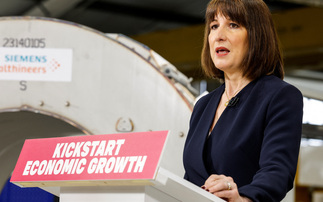
In February this year, Prime Minister Sir Keir Starmer said the funds raised from placing Inheritance Tax on farmers will go towards the NHS. The NHS is, without doubt, under the greatest pressure it has ever seen, but when it comes to health it seems the Government are simply taking from one pot and putting it into another without fixing the actual problem: the food system and the power of processed foods.
And no matter how much money you plough into our National Health Service, the country's health issues can never be rectified if we do not start changing the way we eat and placing more value on food - and those who produce it.
In part, this comes down to the individual and the choices we make, and unfortunately the food industry is driven by influential marketing campaigns that sell the dream of being healthy even when you do not have time to be – even baby food has not escaped the mighty marketing machine, uncovered in a recent BBC Panorama investigation.
But when those in power are being controlled by food industry giants, this country has a problem.
Processed food companies
The Soil Association (SA) has recently launched its Whole Truth campaign which calls on the Government to resist the influence of the ultra-processed food industry, after submitting a Freedom of Information request to the Department of Health and Social Care (DHSC) which found a series of lobbying emails from the Food and Drink Federation (FDF).
In 2023, the DHSC drafted new guidelines so that retailers would be encouraged to put promotions would on whole foods and minimally processed foods, a move that could have allowed people to buy healthier foods for a much lower price.
But after a barrage of emails from the FDF urging for these guidelines to be changed and the term ‘minimally processed' to be removed, the DHSC adhered.
The FDF's members include brands such as Nestle, Pepsico and Coca Cola, and in one email said:
"Please do also let us know as soon as possible when you have clarified next steps for removing the reference to 'minimally processed' from the promotions guidance - as mentioned on the call, this is a particularly contentious issue for our members."
Access to food
The guidelines were set to say:
"The aim of this policy is to shift the balance of promotions towards healthier options - such as minimally processed and nutritious food - and maximise the availability of healthier products that are offered on promotion to make it easier for parents to make healthier choices when shopping for their families by encouraging retailers to use promotions for healthier foods."
Now, it no longer makes any reference to minimally processed and nutritious food.
A FDF spokesperson said the federation were ‘concerned that references to processing in the guidance, which was not covered in the legislation, would cause confusion'.
SA's campaign manager Cathy Cliff said it is not right that ‘big corporations hold the power' and there is sizeable evidence in the emails the SA has obtained that the changes have been made for commercial gain.
She said: "In this case, the lobbying by the ultra processed food industry has removed language that would have been really helpful. The FDF even brag on its website that it has had the term ‘minimally processed' removed.
"It is not right that people who are struggling [financially] only have access to ultra processed foods."
The SA are currently working with Defra on the food strategy, particularly surrounding horticulture with a push for more fruit and vegetables in schools, and its Whole Truth petition has gained traction with over 18,000 signatures.
A Department of Health and Social Care spokesperson said the change took place under the previous Government, and this one is committed to ‘tackling obesity and building a healthier Britain'.
"We are taking action to end the targeting of junk food adverts to children across TV and online and we have handed local authorities stronger powers to block applications for takeaways near schools.
"We are also commissioning research to improve the evidence on the health impacts of ultra processed foods. Through our Plan for Change, we will shift the focus of healthcare from sickness to prevention, reducing the burden of obesity on public services and the NHS."
READ NOW: Putting British food on NHS menus can help boost national health and reach net zero

National health
But earlier this month, Labour delayed legislation that would have banned junk food adverts targeting children due to lobbying by the food industry until 2026, after manufacturers of ultra processed foods raised concerns.
Many have criticised this move and called it a setback.
It is said that food-related illnesses cost this country £268bn, according to a report by the Food, Farming and Countryside commission at the end of 2024.
The report also said ultra-processed foods make up over half of the UK adult diet and almost two thirds of the adolescent diet.
This country, except for the US, has the highest proportion of ultra-processed foods in its diet among western nations, and the ultra-processed food market has grown exponentially over the last two decades, around 8.4% per year.
There is no doubt the country's health system is under pressure, with excruciating waiting lists and overwhelming A&E departments.
Alexia Robinson, founder of Love British Food, is hoping to change the system, however, and introduce more farm produce into schools and hospitals with the hope of improving people's health.
She regularly hosts on-farm visits for NHS catering departments, to link farmers with NHS chefs and build supply chains from the farm gate to the hospital, providing dual benefits for farmers and patients.
She said: "We can now see the pressure the food service industry is under to support unhealthy, processed food - the FDF has done this in such an opaque, manipulative way, flying in the face of all the work that Love British Food and many others do to encourage supply chains of nutritious food throughout hospitality and public sector procurement."
NHS
To claim IHT will help the NHS means nothing if constant lobbying from ultra processed food corporations takes precedent over people's heath and access to better foods.
Research by Love British Food has found that introducing local, seasonal foods onto hospital menus brings patient stays down – in a Lancashire hospital where the pilot project took place, patient stays came down by 1.7%.
Farmers are keen to be part of the health crisis solution too.
Best-selling author and Lake District farmer Helen Rebanks is passionate about this, hoping to showcase the connection between us, what we eat and the health of the land.
The recent success of publications such as Ultra Processed People, by Dr Chris Van Tulleken, has highlighted the damage of ultra processed foods, but the real question is, she said, is what is our Government going to do about it?
"It looks like the answer is not much, because they are being lobbied by giant food corporations, whose only interests are increasing their profits for their shareholders," she said.
"Government is meant to work for us, and to do that it needs to enforce stricter rules, impose taxes on poor foods and regulate things that make us ill. And whilst they are at it, they need to support a food system that helps us all access and consume healthy real foods from British farms.
"We need to teach our children to cook from scratch, and to enjoy real, whole and seasonal foods again. Real food, prepared well, tastes amazing.
"Our Government is spectacularly failing the people of this country when it comes down to food, farming and the environment. It is all inextricably linked. We need holistic solutions, because continuing like this will take us towards a public health emergency.
"It is not too late to change the trajectory. They currently treat our diet, our food system and our environment - which really are one interlinked whole - as an afterthought, when really they are among the most vital considerations of our age."





















